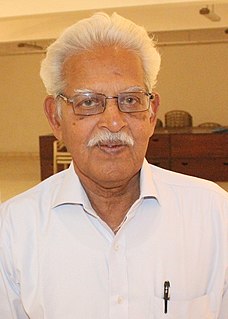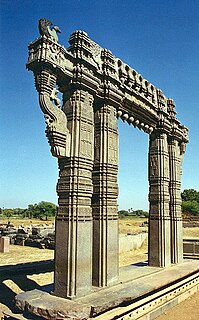
Veturi Sundararama Murthy was an Indian poet and lyricist who is popular for writing Telugu songs. His career in the Telugu cinema spanned more than four decades. He was highly admired and cherished for his deep and meaningful lyrics in Telugu songs. He was considered an inspiration by many lyricists.

Srirangam Srinivasa Rao, popularly known as Sri Sri, was an Indian poet and lyricist who is known for his works in Telugu literature and films. Noted for his anthology Maha Prasthanam, Sri Sri is a recipient of a National Film Award, a Nandi Award and a Sahitya Akademi Award.

Telangana is a state in India situated on the south-central stretch of the Indian peninsula on the high Deccan Plateau. It is the eleventh-largest state and the twelfth-most populated state in India with a geographical area of 112,077 km2 (43,273 sq mi) and 35,193,978 residents as per 2011 census. On 2 June 2014, the area was separated from the northwestern part of Andhra Pradesh as the newly formed state with Hyderabad as its capital. Its other major cities include Warangal, Nizamabad, Khammam, Karimnagar and Ramagundam. Telangana is bordered by the states of Maharashtra to the north, Chhattisgarh to the northeast, Karnataka to the west, and Andhra Pradesh to the east and south. The terrain of Telangana region consists mostly of hills, mountain ranges, and thick dense forests covering an area of 27,292 km2 (10,538 sq mi). As of 2019, the state of Telangana is divided into 33 districts.

Cingireddi Narayana Reddy was an Indian Telugu-language poet and writer. Reddy had produced over eighty literary works including poems, prose-plays, lyrical plays, translations, and ghazals. He was also a professor, lyricist, actor, and Rajya Sabha politician. Reddy was awarded the Jnanpith Award by the government of India in 1988, and he served as the Vice Chancellor of Telugu University.
Majlis Bachao Tehreek is a political party in the Indian state of Telangana.

Hyderabadi Muslims, also referred to as Hyderabadis are a community of Urdu-speaking Muslims, part of a larger ethnic group of Deccani people, from the area that used to be the princely state of Hyderabad in India in the regions of Marathwada, Telangana, and Hyderabad-Karnataka.
Salahuddin Owaisi was an Indian politician belonging to the All India Majlis-e-Ittehadul Muslimeen party and active in the Telangana region. He served as the Member of Parliament from Hyderabad for six consecutive terms until his retirement in 2004.

Pendyala Varavara Rao is an Indian activist, poet, teacher, and writer from Telangana, India. He is an accused in the 2018 Bhima Koregaon violence and has been arrested under the Unlawful Activities (Prevention) Act.

The Razakars were a private militia organised by Qasim Razvi during the rule of Nizam Mir Mir Osman Ali Khan, Asaf Jah VII. They resisted the integration of Hyderabad State into the Dominion of India. They also had plans to make the Nizam accede his princely state to Pakistan instead of India. Eventually, the Indian Army routed the Razakars during Operation Polo. Qasim Razvi was initially jailed and then allowed to move to Pakistan where he was granted asylum, on an undertaking that he would migrate to Pakistan within forty-eight hours of his release.

Geetha Arts is an Indian film production and distribution company established in 1972 by Allu Aravind. The company is based in Hyderabad and has produced around 60 films in Telugu, Tamil, Kannada and Hindi languages.

Suravaram Pratapa Reddy (1896–1953) was a social historian from the Hyderabad State, India.
Kaloji Narayana Rao was an Indian poet, freedom fighter, anti-fascist and political activist of Telangana. He was awarded the Padma Vibhushan in 1992. The Telangana government honored Kaloji's birthday as Telangana Language Day.
Anabheri Prabhakar Rao was a Telangana guerrilla leader and is also considered a foremost authority of the Telugu language. He was an Indian freedom fighter, considered to be one of the most influential revolutionaries of the Indian independence movement. He was an intellectual, military theorist, diplomat and major figure of the Telangana Rebellion. He died fighting against the Nizam and Razakars.
The Hyderabad State Congress was a political party in the princely state of Hyderabad that sought civil rights, representative democracy and the union of Hyderabad with the Republic of India. It opposed the autocratic rule of the Nizam of Hyderabad and the militancy of the Razakars.HSC was formed in 1938.
Dasaradhi Rangacharya, popularly known as Daasarathi, was an Indian writer and politician. He was an active member of the Telangana movement against the autocratic rule of the Nizams. He went underground and took part in the Telangana Armed Struggle till Hyderabad was liberated.
Baddam Yella Reddy was an Indian communist politician from Telangana. He was one of the prominent leaders in the Telangana armed struggle against the Nizam regime.

The history of Telangana, located in the grand region, includes its governance by many rulers. It was ruled by the Satavahana Dynasty, the Kakatiya Dynasty (1083–1323), the Musunuri Nayaks (1326–1356) the Delhi Sultanate, the Bahmani Sultanate (1347–1512), Golconda Sultanate (1512–1687) and Asaf Jahi dynasty (1724-1950).
Syed Aminul Hasan Jafri is an Indian journalist and a Member of Legislative Council from All India Majlis-e-Ittehadul Muslimeen party of the Indian state of Telangana.
Ahmed Balala bin Abdullah Balala is an Indian politician from the city of Hyderabad. He represents the Malakpet constituency in the Telangana Legislative Assembly on an All India Majlis-e-Ittehadul Muslimeen seat. He first won the seat in 2009 and retained it in the 2014 polls.










